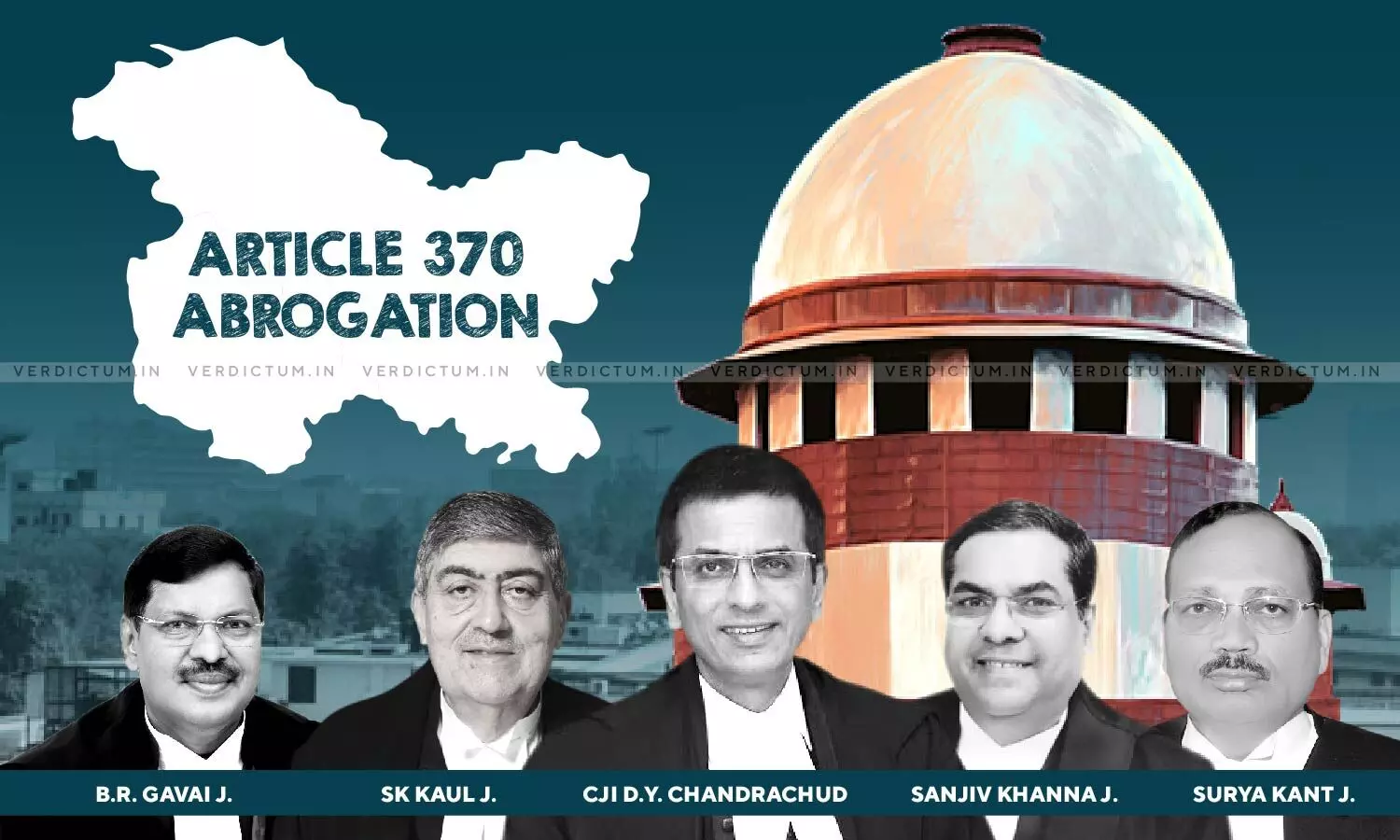
Can Parliament Erase Statehood By Transforming It Into Union Territories: Apex Court Leaves Constitutional Question Unanswered
 |
|The Constitution Bench of the Supreme Court, in a unanimous decision, affirmed the abrogation of Article 370 of the Constitution, which had previously granted special status to the former state of Jammu and Kashmir. However, the Bench declined to adjudicate on the legality of the 2019 legislation that resulted in the bifurcation of Jammu and Kashmir into two separate Union Territories.
The five-judge Constitution bench, led by Chief Justice DY Chandrachud, Justice Sanjay Kishan Kaul, Justice Sanjiv Khanna, Justice BR Gavai, and Justice Surya Kant, pronounced a unanimous verdict upholding the abrogation.
The petitioners had challenged the constitutionality of the decision of the Parliament to enact the Jammu and Kashmir Reorganisation Act 20191 which bifurcated the State into two Union Territories.
"A unilateral exercise of the powers under Article 356 sets a dangerous precedent and raises the apprehension that such a treatment can be extended to any other state of the country in the exercise of emergency powers under the Constitution. It renders the federal structure susceptible to the whims of the political party in power. It can also be used to undermine the special provisions under the Constitution designated for the special interests of the North-Eastern States of India", Petitioners argued before the Supreme Court.
The Court had framed the following issue on this aspect, "Whether the Jammu and Kashmir Reorganisation Act 2019 by which the State of Jammu and Kashmir was bifurcated into two Union Territories (Union Territory of Jammu and Kashmir and Union Territory of Ladakh) is constitutionally valid bearing in mind: i. The first proviso to Article 3 which requires that a Bill affecting the area, boundaries or name of a State has to be referred to the legislature of the State for its views; and ii. The second proviso to Article 3 which requires the consent of the State legislature for increasing or diminishing the area of the State of Jammu and Kashmir or altering the name of boundary of the State before the introduction of the Bill in Parliament."
However refusing to examine the same, the Court resorted to the acknowledgement made by the Solicitor General of India Tushar Mehta, where he asserted that the Union Territory status of Jammu and Kashmir is provisional. SG Mehta had stated that there are plans to reinstate statehood to the region in the future.
Accordingly, the Bench in its judgement observed, "The Solicitor General (for the Union of India) submitted that statehood will be restored to Jammu and Kashmir and that its status as a Union territory is temporary. The Solicitor General submitted that the status of the Union Territory of Ladakh will not be affected by the restoration of statehood to Jammu and Kashmir. In view of the submission made by the Solicitor General that statehood would be restored to Jammu and Kashmir, we do not find it necessary to determine whether the reorganisation of the State of Jammu and Kashmir into two Union Territories of Ladakh and Jammu and Kashmir is permissible under Article 3."
The Court further observed, "The status of Ladakh as a Union Territory is upheld because Article 3(a) read with Explanation I permits forming a Union Territory by separation of a territory from any State. This Court is alive to the security concerns in the territory. Direct elections to the Legislative Assemblies which is one of the paramount features of representative democracy in India cannot be put on hold until statehood is restored."
The Court accordingly directed the Election Commission of India to conduct elections to the Legislative Assembly of Jammu and Kashmir constituted under Section 14 of the Reorganisation Act by 30 September 2024. "Restoration of statehood shall take place at the earliest and as soon as possible" ordered the Court.
The Court left open the question at hand as to whether the Parliament has the authority to eliminate the status of statehood by transforming a State into one or more Union Territories through the exercise of power under Article 3.
The Bench stated, "The question of whether Parliament can extinguish the character of statehood by converting a State into one or more Union Territories in exercise of power under Article 3 is left open. In an appropriate case, this Court must construe the scope of powers under Article 3 in light of the consequences highlighted above, the historical context for the creation of federating units, and its impact on the principles of federalism and representative democracy."
Justice Sanjay Kishan Kaul by a separate, concurring judgment, Justice Sanjay Kishan Kaul proposed the establishment of a "Truth and Reconciliation Commission". This commission, as per Justice Kaul's recommendation, would be tasked with conducting an in-depth inquiry into human rights violations committed by both State and non-state actors in the Kashmir valley, particularly focusing on incidents dating back to the 1980s.
Cause Title: In Re: Article 370 of the Constitution